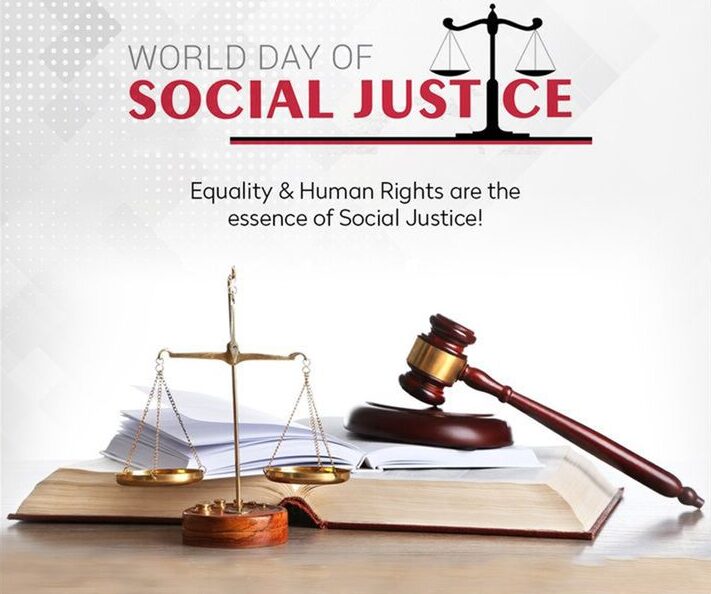🌍 World Day of Social Justice: A Global Call for Equity, Dignity, and Inclusion
Every year on February 20, the global community observes the World Day of Social Justice, a day dedicated to promoting fairness, equity, and inclusion in society. It stands as a reminder of our shared responsibility to dismantle systemic inequalities—be they based on gender, race, economic status, religion, or ethnicity.
- 🌍 World Day of Social Justice: A Global Call for Equity, Dignity, and Inclusion
- 🕰️ History of World Day of Social Justice
- 📅 Timeline of Key Milestones
- 💡 9 Eye-Opening Facts About Social Justice
- ❓ Frequently Asked Questions (FAQs)
- Q1: What is social justice?
- Q2: Why is it observed on February 20?
- Q3: Who can celebrate this day?
- Q4: Is this day linked to other global issues?
- 🎯 Significance of World Day of Social Justice
- 1. ✅ Advocates for Human Rights
- 2. ⚖️ Tackles Systemic Inequality
- 3. 💼 Supports Fair Labor Practices
- 4. 🏫 Emphasizes Access to Education
- 5. 🤝 Promotes Social Inclusion
- 🧍 Observance and Activities
- 🌐 1. Global Events
- 🏫 2. School & University Programs
- 📱 3. Social Media Awareness
- 🎤 4. Voices from the Margins
- 🕯️ 5. Candlelight Vigils
- 💌 Meaningful Wishes and Messages
- 🧠 Key Points to Remember
- 🧬 Daily Life Impacts
- 👨👩👧👦 1. Family & Parenting
- 🧑🏫 2. Education & Learning
- 🛒 3. Ethical Consumerism
- 🏢 4. Workplace Equity
- 💬 5. Conversations Matter
- 📣 Importance to Society
- 🧾 Conclusion: Social Justice Is Everyone’s Responsibility
But beyond the headlines and hashtags, what does social justice really mean in daily life? Why is this observance still critically important in 2025?
Let’s dive into its history, significance, key facts, observances, human impact, and the many ways you can contribute to building a more just world.
🕰️ History of World Day of Social Justice
The World Day of Social Justice was officially adopted by the United Nations General Assembly in 2007 and first observed in 2009. The idea behind it was simple yet powerful: creating awareness and action toward tackling injustice across labor, gender, economic, and ethnic lines.
“Social justice is more than a catchphrase. It is a foundation for peaceful and prosperous coexistence.” — UN Secretary-General’s Message
The initiative emerged from ILO (International Labour Organization)’s Declaration on Social Justice for a Fair Globalization (2008), which emphasized people-centered development and equitable access to opportunities.
📅 Timeline of Key Milestones
| Year | Event |
|---|---|
| 1948 | UN adopts the Universal Declaration of Human Rights, a foundation for social justice. |
| 1960s-70s | Rise of civil rights, anti-apartheid, and feminist movements globally. |
| 1995 | World Summit for Social Development (Copenhagen): commits to eradicating poverty and promoting equity. |
| 2008 | ILO adopts the Declaration on Social Justice for a Fair Globalization. |
| 2009 | First World Day of Social Justice observed on February 20. |
💡 9 Eye-Opening Facts About Social Justice
🌐 More than 1.3 billion people still live in multidimensional poverty.
🧑🤝🧑 Women worldwide earn 23% less than men on average.
🧒 Over 160 million children are involved in child labor globally.
🧑🦽 People with disabilities are three times less likely to be employed.
🏠 Nearly 1 in 5 people globally face housing insecurity.
🌍 Only 20% of countries have achieved full legal gender equality.
🧑⚖️ Access to free and fair legal representation remains limited in developing nations.
🏳️🌈 LGBTQ+ individuals face legal discrimination in over 65 countries.
📚 Education access remains a major barrier—over 244 million children and youth are out of school.
❓ Frequently Asked Questions (FAQs)
Q1: What is social justice?
A: Social justice refers to a world where everyone has equal rights and access to opportunities—regardless of their background.
Q2: Why is it observed on February 20?
A: That’s the date set by the UN to promote actions that tackle global inequality and bring attention to human dignity.
Q3: Who can celebrate this day?
A: Everyone! Governments, schools, businesses, and individuals—all have a role in fostering social justice.
Q4: Is this day linked to other global issues?
A: Absolutely. It overlaps with issues like poverty eradication, human rights, climate justice, gender equality, and fair employment.
🎯 Significance of World Day of Social Justice
1. ✅ Advocates for Human Rights
Social justice is the core of human rights. It reminds us that peace is impossible without dignity.
2. ⚖️ Tackles Systemic Inequality
From racism to poverty, this day shines a spotlight on institutional systems that continue to disadvantage the vulnerable.
3. 💼 Supports Fair Labor Practices
The day is critical in promoting decent work, fair wages, and workers’ rights, especially in the post-pandemic era.
4. 🏫 Emphasizes Access to Education
Education is a pathway to justice. The day brings attention to marginalized communities being left behind.
5. 🤝 Promotes Social Inclusion
It fosters the idea that every person—regardless of identity—deserves to be heard, valued, and supported.
🧍 Observance and Activities
🌐 1. Global Events
UN bodies, NGOs, and civil society organizations hold seminars, webinars, and campaigns.
🏫 2. School & University Programs
Many schools run essay competitions, debates, and educational workshops on human rights and equality.
📱 3. Social Media Awareness
#SocialJusticeDay trends globally with facts, art, and stories of hope and resistance.
🎤 4. Voices from the Margins
Special efforts are made to amplify voices of the underrepresented—migrants, Indigenous peoples, women, refugees.
🕯️ 5. Candlelight Vigils
In some regions, peaceful gatherings or vigils are held to remember victims of injustice.
💌 Meaningful Wishes and Messages
🕊️ “Let fairness, dignity, and justice be the pillars of our society. Happy World Day of Social Justice!”
✊ “May we rise for those whose voices are silenced. Let’s build bridges, not barriers.”
🌈 “Together we can create a just world. One action, one heart, one day at a time.”
💡 “On this day, let’s commit to a world where opportunity doesn’t depend on birth but on humanity.”
🧠 Key Points to Remember
🌍 Observed on February 20, every year.
🧑⚖️ Promotes equity, fairness, and human rights.
🧩 Addresses discrimination, poverty, and exclusion.
🏫 Involves education, awareness, and action across sectors.
🌎 Recognized by the United Nations and supported by global partners.
🧬 Daily Life Impacts
Even if you’re not an activist or policymaker, social justice starts with YOU. Here’s how it translates into daily life:
👨👩👧👦 1. Family & Parenting
Raising children with empathy, respect, and awareness of diversity lays a foundation for a just society.
🧑🏫 2. Education & Learning
Educators can shape inclusive classrooms where every student feels represented and supported.
🛒 3. Ethical Consumerism
Buy from brands that support fair trade, eco-sustainability, and worker welfare.
🏢 4. Workplace Equity
Push for policies like equal pay, inclusive hiring, and mental health support.
💬 5. Conversations Matter
Challenging bias, stereotypes, and privilege in everyday conversations can spark real change.
📣 Importance to Society
World Day of Social Justice is not just about one day of awareness—it’s about long-term transformation.
🔧 Encourages policy change and legal reforms.
🤝 Builds social cohesion and mutual respect.
📚 Educates youth on moral responsibility and activism.
🌿 Contributes to sustainable development goals (SDG #1, #5, #8, #10, #16).
🧡 Creates a culture where no one is left behind.
🧾 Conclusion: Social Justice Is Everyone’s Responsibility
The World Day of Social Justice isn’t only for diplomats, lawyers, or human rights organizations. It’s for everyone who believes in fairness. In a time when inequality is both visible and invisible, this day calls us to be more conscious, more active, and more human.
“A just world isn’t a gift—it’s a commitment.”
Every act—whether small or bold—can ripple into meaningful change. Whether you speak out, educate others, volunteer, or simply listen and learn, you are part of the global justice movement.








